Send in the clowns about ”Joker”.
Joker is a lost movie, perhaps more lost than its hero. The production, which draws a handful from the masters of cinematography by presenting a collage, with some need to emerge a new quality but ultimately establish - whether visual or thematic turn out to be empty. To film who wants to lead the viewers at the borders, but when they gather us to the end, they lost and don't know which direction shows. Ultimately, it can't tell everything. And although it is a beautiful, real or painful production at once, after seeing it I feel mostly frustration. And not necessarily the one that the creators wanted to arouse. The post contains small spoilers but does not talk about the linear course of the film's plot.
The story takes place in Gotham, which is not Gotham, but New York glued with references to the best films of Martin Scorsese. This spatial realism of the film is probably the strongest element of the story. The metro, everywhere thrown trash, falling into the ruins of used communal buildings - all this makes us realize the situation, how far the tale coming out of the world of comics has departed from the gothic contractual Gotham by Tim Burton. Includes such Gotham is a symbolic "city of all cities" - recognizable as the shadow of New York, but it can equally well be any big city struggling with endless administrative problems. Like the falling Detroid or Los Angeles with more and more homeless live on the streets. Putting story of the film in the 80s evokes additional memories of the modern American epidemic of violence, increasing the social stratification and the fall of some of America's dreams of full potential. And here I will not have any comments - I think it is one of the most intelligent procedures of the film, which goes the realism of the comic adaptation - known from the production of Nolan a step further and probably does it better in this decorative layer. Maybe because Nolan won such a simple visual gloom, and in Joker the city is the scariest when it is a bright day.
The creators of the film with the participation of our hero Arthur Flack - a sick man, rejected, lost, sharing his unsuccessful life in loneliness with his elderly sick mother. At first glance, Arthur is a typical representative of the excluded class, who has access to the big world only in the evening watching TV as more important and wealthier than them laugh at the absurdities of everyday life. The list of dreaming positions is part of this world, but the doors are divided for them. How much? The film can't help but slam the door in front of Arthur's nose at every step, actually forcing the viewer (who, after going to the cinema knows the punch line of the whole story) to bet on the head when eventually this humiliated man will have enough.
Breakthrough quite quickly, although the wave of humiliation continues. Violence escalates, but there is no answer to this question. In the end, chaos engulfs the whole city and our hero asks - why everyone couldn't just be nice to each other. The question is so resonant that it is asked by someone from a finger on the trigger of the gun.
Well - seemingly the film is trying to tell us a story about how the exploitation and persecution of the lower classes and the excluded can eventually get revenge. That a humiliated man will eventually wake up. The problem is, after all, it's not about improving the lives of the lower classes so that they don't kill us. And if this is our thinking, it means that the dominant way of thinking is the upper class. We are afraid of otherness so we must tame her so that she does not turn against us. It sounds a bit different than - we have to respect another man because he is a human. Similarly with the problem of exclusion due to mental problems. Arthur is a sick man - healing himself but having neurological symptoms in the form of uncontrolled laughter. The fact that society rejects it is a good diagnosis of the hopeless situation in which many people with mental disorders find themselves. Similarly, the scene in which Arthur is deprived of psychiatric help is a good commentary on what is happening in the States where helping sick and disturbed people is difficult to find (in other countries it is not that easy either). But again - all the people disturbed in this film eventually turn out to be aggressive or hurt others. On the one hand, the film wants to point out the problems of the excluded minority but at the same time duplicates the vision of "dangerous madmen". Let's be nice to them, then they should not to kill us. Again, this is not necessarily what this mantra should sound like. Another thing is that the only manifestation of kindness or attempts to reconcile is a young girl from the same building as Arthur ultimately ends on average. I also have the impression that Joker, taking advantage of the fact that it happens in the 80s, wants to explain why it allows itself this and not a different approach to the mentally ill. Which does not change the fact that in a really harmful way it shows drug withdrawal.
To some extent, Joker is a film about replicating violence. This is one of the threads with which I have the most problems. Perhaps because it is completely devoid of the element of compassion or social element. Without it, we get a story that somehow makes from victims perpetrators. We are talking about the story of the mother of the hero who, being disturbed herself, could not help her son and even contributed to his problems. The film is unable to show us the mother as a person who is actually innocent of her behavior. Instead, congenital disease becomes a kind of punishment, an acquired disease. The hero could be happy and "normal" if a normal person took care of him. Ultimately, all this becomes the fault of the disturbed people who - should actually be separated. It is sad that in this narrative a mentally ill woman is shown mainly as a mother who has not fulfilled her duty towards the child. It struck me how much this thread strikes the well-known scheme of showing women with disorders in pop culture. In general, this is one more thing - we again get the movie properly without women. I know that I should get used to it, but lately I have the impression that the cinema has got a bit fixed on sad white men.
However, what touched me the most in the film is its apparent apoliticality, which the hero confesses several times. "I'm not political", "It's not political" - as if the director, through the lips of the hero, begged us not to think too much about the political and social implications of the situation presented in the film. Meanwhile, you have to look at them because - attention, attention - films function in society. What does it mean? That when we observe street riots directed against the rulers and millionaires, we must ask the question - how does what we see in the film relate to any political or social narratives. And here probably the Joker loses the keys the most and offers several symbolic scenes to cover it's own confusion. Crowds on the streets of Gotham bring anti-system slogans, but are commanded by a murderer (his murders are enthusiastically received), a madman, a lost man. The film, which theoretically wants to speak on behalf of a minority, makes a conservative act in its last act. The murdering and raging crowds on the streets do not arouse sympathy, and their postulates are blurred in widespread demolition. The social movement against exclusion becomes a mob led by a madman. Ultimately, therefore, the film does not speak in the voice of the excluded, who demand that they be noticed, but rather cuddles to the sleep of the powerful of this world, showing social revolt as a dangerous mob. These people on the streets are apolitical in the film and not knowing what they want besides to kill millionaires. Oh, yes, one percent can sleep peacefully. Hollywood will take care of them. It is a bit sad that we are looking for a narrative about exclusion in Joker, who is not very able to say anything specific. I have the impression that the director wanted to propose to us through the character of Joker as the personification of choasu as such. Nothing more than that.
Why is Joker a movie that impressed so many people? In my opinion, for three reasons. The first is prosaic and is a results from how we perceive good cinematography. For most of us, the connection - sad means important, is so obvious that we don't even try to question it. The more we are depressed by some vision of the world, the more important it seems to be. We are taught that only tragedy is real, and comedy is a kind of escapism. The problem is that in my opinion a certain concentration of tragedy is pure manipulation. It builds the impression of validity but in fact it requires nothing more from the creators than just adding more sad elements. For me, this is a cynical element, because thanks to the concentration of tragedy, it is easiest to fabricate depth. The second issue is the matter of what I wrote at the beginning. In my opinion, Todd Philips borrows from the other directors both the style and symbolism that his film fills. I don't require anyone to know American cinema from the 80s. I think that this is not necessary. What does not change the fact that when you saw a Taxi Driver, you see how much Philips borrows, but only the top layer of the story. It is impressive, but it is borrowed to some extent. I had a similar impression with The Great Beauty - I liked the movie but not so much because Sorrentino seduced me a second time - borrowing from Fellini. However, if I didn't know Fellini, Sorrentino would make an unforgettable impression on me. The last third element - Jaquin Phoenix.
You could probably write another post about the role of Jaquin Phoenix. On the one hand - you can approach it cynically - it is another role that has been written for almost all awards. Handsome, efficient, mentally stable actor, plays emaciated, depicted to the world as repulsive, a man with disorders. It is strange that the Academy did not interrupt the screening to give him an Oscar. At the same time, however, there is something magnetic in the role of Phoenix. Scenes in which his Joker dances may not make much sense in scenario, but they are to be able to admire how the actor harnessed all his physicality to the role. It is also great that he transforms from a lost man who will always arouse some discomfort among those around him, into a man who gains confidence and has nothing to lose. In these last scenes he is almost a different man and I must admit that if he put him in any production with Batman we would get a confrontation from which shivers go down the back. This is a magnetic role and without it there is no film because no one else gets anything to play here. I find all admiration for the small role of Robert DeNiro exaggerated. At the same time, however, I must admit that although Phoenix plays well, the director leads the role so that I'm not a bit surprised by the fears of the American police that someone might consider Arthur as an example. It is a film that can be interpreted in accordance with the inceli way of thinking - where the desire to annihilate yourself turns into a desire to annihilate everyone around you. In some aspects, I have the impression that this film is a bit like 13 Reasons Why, which shows the way a disturbed person thinks as the only logical way out of the situation, without giving any other logical counterpoint in the narrative.
When it comes to directing the production, I have mixed feelings. On the one hand, there are plenty of painting frames in this film, on the other - a little too much delight with them, a little too often, the director replicates the tricks that have already proved his worth once. Personally, I hug anyone who manages to make any movie about changes or mental breakdowns without scenes in which the hero looks at himself in the mirror. In cinematography, we seriously consider this frame to be finished, let's find another one. I also have the impression that some of the ideas introduced to the film are superfluous there. The whole plot of a girl living on the same floor seems to be just to let the viewer know what his punch line will be like, which in my opinion shows some inefficiency in directing. The Joker is full of scenes that look great in the trailer when we expect them to be some eloquent punch line for specific moments in the script but ultimately they are only a celebration of their own delight over the chosen style. Anyway, this movie is full of symbolism or references that would work much better if they were cut in half. Not every inscription must be symbolic, not every staircase must show the suffering of the hero.
The Joker is a milestone in the world of movies adapting comic characters to the needs of the big screen. It is a new stylist, proprietary approach and final break with the scheme of necessary moral triumph, which seemed to be an inseparable element of such productions. The question is, however, have we received enough under this new convention? In a world where the billionaire is a super hero, the villain is a man from the social lowlands. However, order is on the side of the millionaire. The threat is the "revolution" of people who do not know how much they are used. Who bring slogans so empty that God forbid nobody associates them with real social movements demanding change. After all, we of the real world are losers. Especially the excluded, whose voice, as you can see, is still not enough to hear or understand. Because you know ... we live in a society.
Ps: I think the film has absolutely phenomenal music and the use of songs known from "our" presented world. Although if Stephen Sondheim exists in Batman's world, I don't believe that he would not write a musical about him.
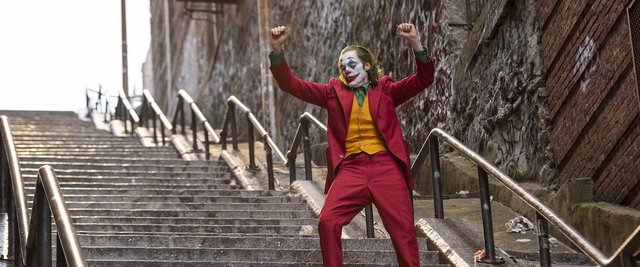
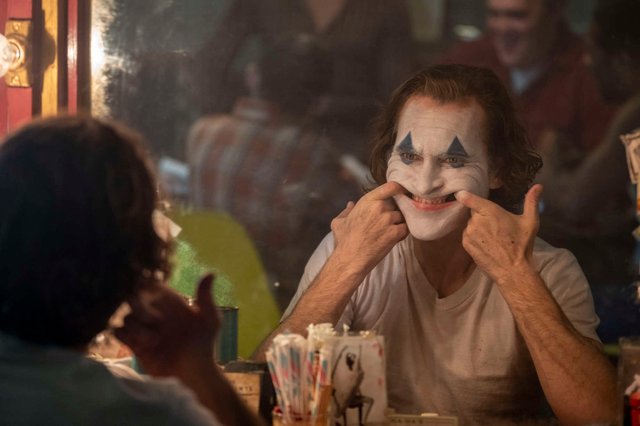
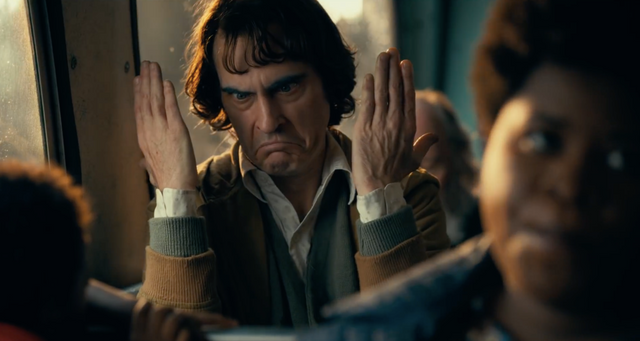
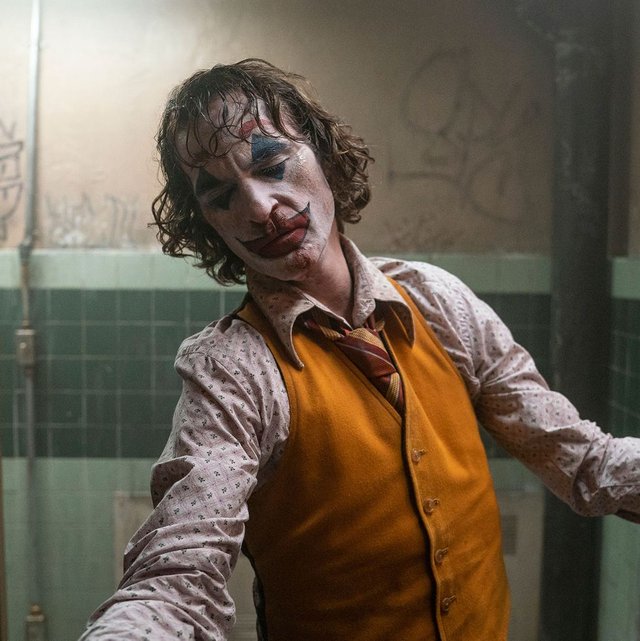
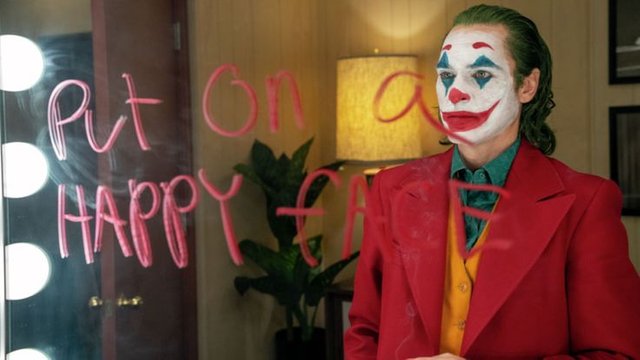
@tipu curate
Upvoted 👌